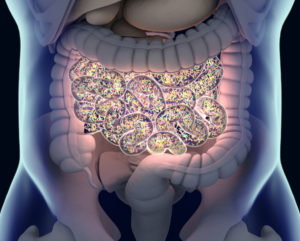Once thought to be a relatively simple bodily system, we are now learning more and more about our digestive system and the major impact it has on our overall health.
Links are now being made between our digestive health and our immune system, mental health, endocrine system, skin diseases and even certain cancers. As a result, doctors are now stressing their patients to practice good “gut health,” which involves taking certain measures to protect and maintain proper functioning of our digestive system.
There are many ways an unhealthy gut can reveal itself. Obvious symptoms such as an upset stomach, gas, bloating, constipation, diarrhea, or heartburn can all be signs of an unhealthy gut.
Poor gut health can affect the functioning of the autoimmune system, leading to the body attacking itself. It can also be the reason for the development of certain food intolerances due to poor quality of bacteria in the stomach. Unintentional weight changes, skin conditions such as eczema, and sleep disturbances such as insomnia and fatigue can all also be linked to poor gut health.
There are several things that a person can do to improve their overall gut health, including:
- Lower Stress Levels – Some ways to do this involve practicing meditation or yoga, taking a relaxing walk, or receiving a massage.
- Get Enough Sleep – Try to prioritize getting at least 7–8 hours of uninterrupted sleep per night.
- Eat Slowly – Chewing your food thoroughly and eating more slowly can help promote full digestion and absorption of nutrients
- Stay Hydrated – Drinking plenty of water has been shown to have a beneficial effect on the lining of the intestines, as well as on the balance of good bacteria in the gut
- Take a prebiotic or probiotic – Prebiotics provide “food” meant to promote the growth of beneficial bacteria in the gut, while probiotics are live, good bacteria
- Check for Food Intolerances – . By eliminating certain common food triggers you may be able to identify a food or foods that are contributing to your symptoms.
By concentrating on your gut health, you will not only improve the functioning of your digestive system, but you can also experience many other benefits to your overall health.
If you are experiencing problems that might be due to poor gut health, please speak to your physician. To make an appointment at Flushing Hospital, please call 718- 670-5486.
All content of this newsletter is intended for general information purposes only and is not intended or implied to be a substitute for professional medical advice, diagnosis or treatment. Please consult a medical professional before adopting any of the suggestions on this page. You must never disregard professional medical advice or delay seeking medical treatment based upon any content of this newsletter. PROMPTLY CONSULT YOUR PHYSICIAN OR CALL 911 IF YOU BELIEVE YOU HAVE A MEDICAL EMERGENCY.


